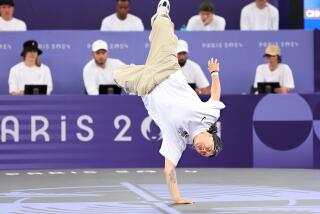Miranda’s Decision
- Share via
INDIANAPOLIS — When Patricia Miranda enters Yale Law School this fall, she plans to study conflict mediation. Understandably so, since she has already had plenty of it to mediate, much if it in her household.
Miranda could become the first woman to win an Olympic gold medal in wrestling, yet her career has been filled with far more setbacks, hurt feelings, defeats and, yes, conflicts, than most elite athletes ever endure.
There were the fellow students who called her “a joke” for wrestling on the boys’ team at Saratoga (Calif.) High, and the father who so opposed her athletic career he nearly went to court to fight it.
There were the endless months of training with the Stanford University men’s team that left her with cuts, bruises and black eyes but no perceptible on-mat success. There were the whispers, the stares, the impolite questions from strangers who wondered what she thought she was accomplishing as a woman struggling in what has traditionally been a man’s sport.
Miranda’s answer: She simply wanted to compete in the sport she loved, gender be darned.
“Competing in high school and college, I never thought of myself as a female,” said Miranda, the 105 1/2-pounder on the first U.S. Olympic women’s wrestling team. “In fact, I asked they take down all the mirrors so I couldn’t use it [being a female] as an excuse for why I didn’t wrestle well.”
That was quite often for an undersized female -- she’s only 5 feet tall -- competing against bigger, stronger males. It got even worse at Stanford, where she spent five seasons as little more than practice fodder at 125 pounds, 10 above her natural weight. She got into matches as a senior only after one wrestler was injured, another couldn’t make weight and a third had grade troubles.
Her record in college-only matches was 1-7, with the only victory by forfeit. She was 3-13 overall, beating a community college male wrestler and another woman in an open tournament.
Women’s wrestling really wasn’t a full-time option; only a half-dozen U.S. colleges sponsor the sport, none of them big-name schools. Also, she had promised father Jose Miranda, a doctor who had long opposed her career, that she would get all A’s if he allowed her to wrestle. She kept the promise, graduating Phi Beta Kappa with a bachelor’s degree in economics and a master’s in international policy.
Deep down, what might have kept her going through all those miserable practices in which she was badly overmatched was the hope women’s wrestling would someday be a socially acceptable, Olympics-approved, for-real sport like gymnastics or swimming.
She got her wish two years ago when the sport was accepted into the Olympics. Finally, the two-time world silver medalist, World Cup champion and Pan American Games champion no longer has to worry about being one of the guys; it’s OK to be a wrestler who’s a woman.
Now she has one goal: to walk off the mat Aug. 23 as the first women’s wrestling gold medalist.
More to Read
Go beyond the scoreboard
Get the latest on L.A.'s teams in the daily Sports Report newsletter.
You may occasionally receive promotional content from the Los Angeles Times.






